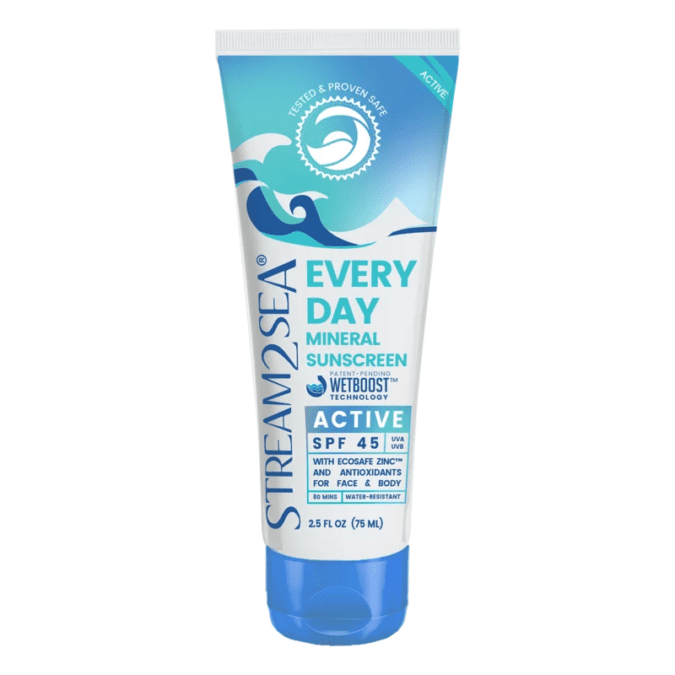No products in the cart
Dive Deeper Blog
Top Reasons to Wear Sunscreen Every Day
We all know we need to use sunscreen to protect our skin if we’re going to spend any time outdoors, but do you know why you should wear sunscreen every day?

Reduce Your Sunburn Risk
Every dermatologist will emphasize the need to use sunscreen to avoid sunburns. Not only are they miserable when they happen, but they cause long-term damage to your body. Too much sun sets off a complex chemical reaction that creates free radicals. Those free radicals damage your DNA, greatly increasing your chances of being diagnosed with skin cancer. And that nasty peeling skin – that’s skin that’s been so damaged that it dies and your body sloughs it off. You may need to contact your dermatologist if you get a severe burn with blistering.
Avoid Premature Signs of Aging
Even without a significant sunburn, a small amount of sun can make you look older. The same free radicals that cause skin cancer also damage your skin’s collagen and elasticity, and cause wrinkles, discoloration and “leathery” skin over time. People who spend time in the sun without using sunscreen often experience photo-aging, or premature aging, beginning as early as their 20s and 30s.
Stop Skin Discoloration
Too much sun obviously causes cute little freckles if you’re young enough to be cute. As we get older though, living with skin discolorations takes on a different hue. These discolored patches, which are often tan to brown, are also known as “sunspots” or “liver spots.” Both men and women are susceptible to them, and they often show up on the hands, arms, head, hands, and face.
Lower Inflammation
When overexposure to the sun causes free radicals to attack your cells, your body responds by recruiting inflammatory compounds to combat the damage. The brighter red your skin gets, the more inflammation the sun has caused. For some people, this can cause or exacerbate issues like psoriasis or rosacea. If you have sensitive skin that is prone to redness, look for a sunscreen with calming ingredients like zinc oxide or titanium dioxide.
But Not All Sunscreens are Created Equal
Standing in the sunscreen aisle is kind of like a kid in a candy store trying to decide which is best. Every label proclaims that their product is the finest on the market (and you can’t rely on what the front label says about the actual ingredients in a sunscreen anyway). By law, all sunscreens must display an SPF – sun protection factor – that can range from 20 to more than 100. Even so, those numbers can be deceptive. An SPF of 30 means that you can stay in the sun without damage for 30 times as long as you could with no protection because it blocks 97% of the rays. The SPF of 100 means you can stay in the sun for 100 times longer without damage because it blocks 99% of the rays.
Clearly, the higher the SPF doesn’t really mean that much in terms of actual protection, but it does mean that the manufacturer has layered multiple petrochemicals into their product to achieve what most experts believe to be a marketing gimmick. The FDA revoked those petrochemical ingredients’ GRASE status – Generally Recognized as Safe and Effective – in 2021, meaning that the only ingredients they currently consider to be safe and effective are zinc oxide and titanium dioxide, which are naturally occurring minerals not petrochemicals.
Another critical benefit to mineral sunscreens are their broad-spectrum protection. The SPF refers specifically to UVB rays that cause sunburns. UVA rays, on the other hand, are less likely to cause an immediate burn but they penetrate more deeply, into the layer of your skin where most cancers occur. They also are more likely to cause premature aging.
And unlike UVB rays that you can see and feel, the UVA rays are everywhere all the time. They maintain the same strength all year long and can penetrate windows and cloud cover.
Stream2Sea’s mineral sunscreens – including the original Sport Sunscreen, the EcoStick Sport Sunscreen and the new Every Day Active Sunscreen – are all formulated to protect your skin from both UVB and UVA rays. (They’re also the only sunscreens in the world to have been tested and proven safe for fish and coral larvae, but that’s a different blog.)